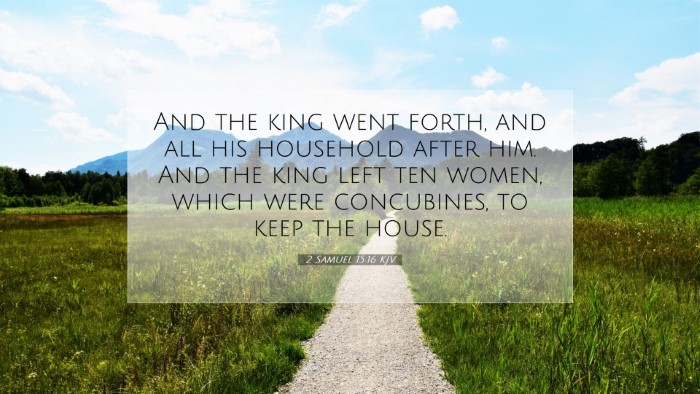Commentary on 2 Samuel 15:16
Verse: “And the king went forth, and all his household after him. And the king left ten women, which were concubines, to keep the house.”
Overview
This verse presents a poignant moment in the narrative of King David's reign. It follows the tumultuous events of Absalom's rebellion, highlighting David's strategic retreat from Jerusalem while leaving behind ten concubines to manage the royal household. The implications of this action resonate throughout the text, symbolizing both personal loss and political maneuvering.
Historical Context
The backdrop of 2 Samuel 15 reveals a period of significant instability in Israel, marked by family betrayal and civil strife. Absalom, David's son, has claimed the throne, leading to David's flight from Jerusalem. This moment underscores the fragility of power and the personal stakes involved in leadership.
Theological Insights
This passage warrants careful theological examination, especially in the context of biblical themes such as loyalty, family honor, and divine providence. The departure of David can be interpreted as a moment of humility and submission to God's plan amid rebellion.
David's Leadership
Matthew Henry posits that David's exit from Jerusalem exemplifies a ruler's resilience in the face of adversity. By choosing to leave rather than confront Absalom directly, David demonstrates prudence over rashness. Such leadership is characterized not by brute strength, but by an understanding of circumstances and the importance of saving lives.
Abandonment and Sacrifice
Albert Barnes highlights the emotional weight of David's decision to leave behind his concubines. Their presence serves multiple purposes: they are left to care for the palace, but they also represent the king’s sacrifices in times of conflict. This act can also be viewed as abandonment, emphasizing the personal cost that leadership entails.
Cultural Significance
Adam Clarke offers insights into the cultural norms of the time, noting that concubines held a specific status in the royal household. Their presence in David's home signifies his wealth and status, yet their abandonment illustrates the depths of his crisis. This aspect resonates with contemporary themes of responsibility and care in leadership.
Symbolism of the Concubines
In biblical literature, the concubines can symbolize loyalty and betrayal. Their fate, left to manage the remnants of David's household, invites contemplation on the nature of loyalty amidst turmoil. Their narrative is inextricably linked to David’s larger story of sin, redemption, and the consequences of familial discord.
Gender Perspectives
The mention of these women raises significant questions regarding the role of women in the biblical narrative. They are significant yet often overlooked; their experiences reflect the complexities of power dynamics within royal households. Theologians might explore the implications of patriarchal structures evident in this narrative.
Spiritual Lessons
- Faith in Adversity: David's faith and ultimate reliance on God become focal points even in his darkest hours. This emotional reality prompts reflection on how leaders are called to act under pressure.
- Understanding Authority: The verse illustrates the question of rightful kingship and authority. David’s experience serves as a reminder that power comes with responsibility, loyalty, and the potential for significant loss.
- God’s Sovereignty: The unfolding events can be interpreted as part of God's sovereign plan, even when they seem chaotic. This aligns with the broader biblical narrative where God's providential hand is evident through historical occurrences.
Practical Applications
The themes encapsulated in 2 Samuel 15:16 are applicable to modern life in various ways:
- Leadership Lessons: Leaders today can draw from David’s example, learning the value of seeking counsel and remaining composed in crises.
- Community and Responsibility: This text invites reflection on how responsibilities are shared within communities and the sacrifices made for others.
- Personal Reflection: Individuals are encouraged to reflect on their own lives regarding loyalty, obedience, and the nature of their commitments.
Conclusion
2 Samuel 15:16 not only serves as a historical marker in the life of David but also holds profound theological insights for pastors, students, and scholars. The interplay of power, identity, and sacrifice illuminates the complexities of human relationships in the realm of divine purpose.


